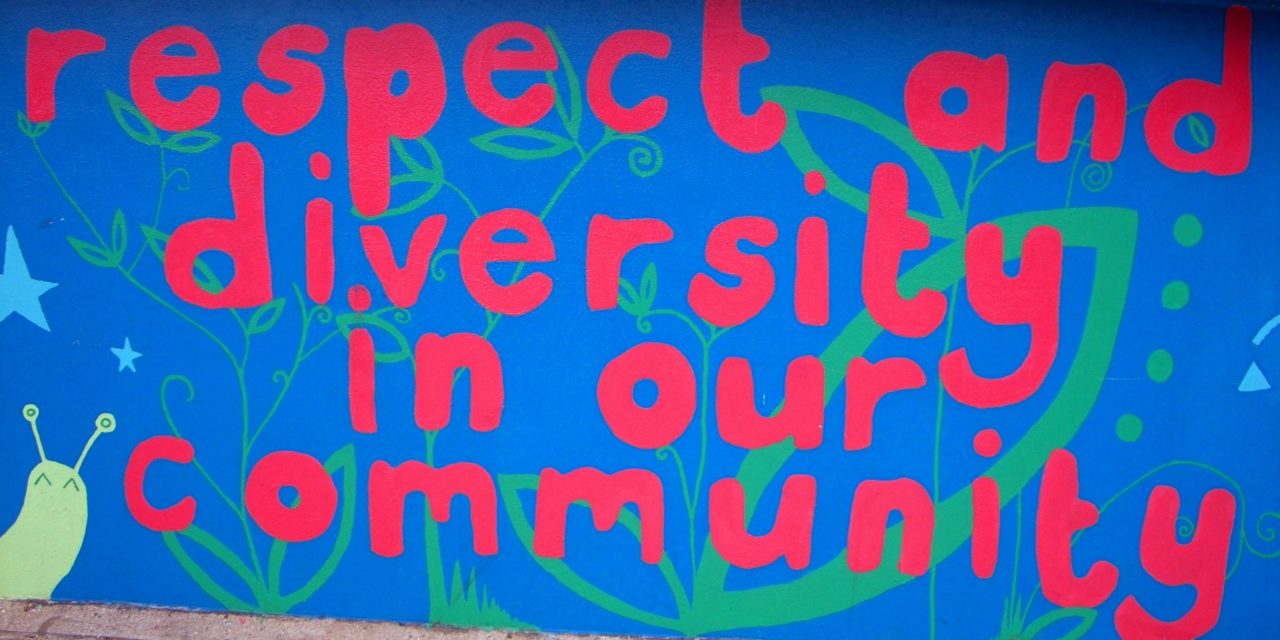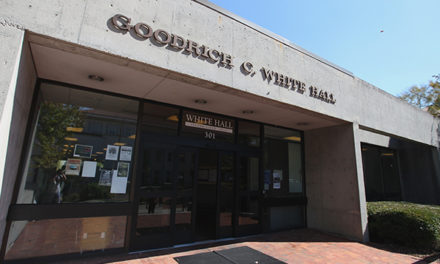The last week at Emory has been a whirlwind of chalk, protests, emails from administrators and polemic media coverage. I believe that this latest campus controversy presents an opportunity for us as a student body and academic community to listen and learn, to take a step back from our preconceived notions of ourselves and of each other and to move forward to address better the issues facing our campus, our communities and our nation today.
As members of a university, we should welcome the opportunity to be intellectually challenged instead of trying to shout one another down. Media coverage of the chalking incidents has sensationalized and decontextualized the chalkings, the protests and the administration’s response. We should not let the media’s coverage of this latest campus controversy allow us to become divided or hateful towards one another.
Student protesters gathered in front of the Administration Building and demanded that they be listened to in order to share an issue that is significant to them.
For many of them, the ubiquity of the chalking, the violation of Emory’s chalking policies and the location near important centers of cultural identification (such as on the steps near the Centro Latino) on campus made the chalking feel personal, targeted and hurtful. It is not so difficult to imagine how a member of a minority that Donald Trump has targeted explicitly either through promises of a temporary ban, deportation, implications of police violence or hurtful rhetoric could feel that the chalking of his name on campus was meant as something more than a simple endorsement of his candidacy for president.
In fact, Trump’s name as an implication of racist attitudes towards Hispanics, Muslims and other minorities can be evidenced by some high schools taunting minority-dominant teams with chants of “Trump! Trump! Trump!” at sporting events in Indiana and Iowa as recently as last month.
It is not our place as a community or as individuals to judge whether or not minority students’ reactions to a political statement is proportional, valid or justified. Freedom of speech does not mean getting to say whatever you want without disagreement and debate from your peers. However, there is a difference between disagreeing with a person’s opinion and invalidating the protesters’ emotional or intellectual responses to something because you cannot relate to their personal situation. Just as the student(s) had every right to chalk Trump’s name all over campus, student protesters have the right to stand and chant in front of the Administration Building to protest against a man whose rhetoric and policies marginalize minorities.
Who are we to tell our peers what they should or should not feel? Disagreeing with someone’s opinion or reaction should not immediately invalidate its worth in a discussion. Insulting and belittling our fellow students for their emotional and intellectual reactions in the wake of the Trump chalkings (something that they may feel very deeply affected by) are neither constructive nor productive; it only sets the tone for a more adversarial and polarized conversation.
This is a call for us to listen more humbly in order to further a discussion on justice and race on our campus and in the United States. The next time you feel compelled to judge the reaction of a peer of color, silence your judgment and open your mind in order to listen to the experience of a peer who is profoundly different from you — an experience that we are lucky and privileged to have at Emory. Embrace the opportunity to be challenged by and engaged with students who come from vastly different incomes, racial and ethnic backgrounds and parts of the world. One of the most important things we can do during our time at Emory is to learn from each other, take a good look at ourselves and ask what we can do to make our communities, our nation and our world a more equal and just place.





I just signed the petition, “Colorado Governor: Label Black Lives Matter a Hate Group!.”
https://www.change.org/p/colorado-governor-label-black-lives-matter-a-hate-group
please sign!
Gawd, when are these babies going to stop whining? Maria, go back to your mommy’s basement, cuddle up with some puppies and a blanky, and have some cookies and warm milk. Because you certainly aren’t ready for the real world. We are not interested in your hurt feewings.
I know I’ll regret commenting on the Internet, but did you read the article in full?
Maria wrote a well-reasoned, balanced article. The point of the article isn’t “Chalk makes me so upset that I can’t deal,” but rather a call for an open, healthy discussion on campus. Most importantly, recognizing that the emotions of people of color are valid doesn’t mean that one isn’t “ready for the real world.” Your comment is an exquisite example of an unhelpful, condescending attitude all too common.
Pardon me, but labeling 20 people’s reactions as the reactions of “people of color” is silly.
It was a tiny portion of the school. They literally do not represent every person of color in your university. Just the most overtly vocal people who are easily traumatized.
I might add that the chalk was never the issue.
The issue is these babies whining to the administration because of their self-induced “pain” upon seeing something they didn’t like being expressed.
And in that whining, they asked the administration to suppress.
This whining was not about “recognizing the emotions of people of color”. If it were, they didn’t express it very clearly.
Because of the way they handled this “non problem”, they are being very justly publicly shamed. These kiddies aren’t victims. Plain and simple.
Condescension and mockery are appropriate, reasonable and predictable responses to special snowflakes who claim to suffer pain and demand punitive action when they see innocuous chalk messages. Failure to adequately mock such nonsense is a big part of the reason why campus political correctness has reached such levels of absurdity around the nation.
“…silence your judgement…”? So empathy is a one way street for “peer[s] of color?” In and of itself that’s racist, implying that peer – because he or she is of color – does not have the emotional maturity to be taken as a peer. I’m not a Trump fan, but I do work in investment management, though far (far, far) from a billionaire but if I get upset by Bernie casting me as the devil I’d be seen as immature at best.
Face it, the media (and America) are skewering Emory for good reason. You all better be prepared for this to come up in job interviews!
What will happen to these special, little snowflakes when they get a real job and they spot a “Trump” bumper sticker on a car in the employee parking lot? Run to management, demanding that employee be fired? Or when a colleague comes to work in a “Make America Great Again” Trump T-shirt? Scurry to their boss claiming their colleague committed a “micro aggression” against them? Emory is raising a generation of crybabies who will be ill prepared for the big, bad world where, God forbid, others may actually disagree with them! The greatest generation that fought in WWII, enduring horrific suffering, must be rolling their collective eyes (yes, another micro aggression!) over this coddled generation that flees to therapy over “Trump” chalkings, “culturally appropriated” Halloween costumes (Yale), journalists doing their job (Mizzou), and tiny sombreros (Bowdoin College). I fear for the future of this country if these bedwetters ever get into power.
“It is not our place as a community or as individuals to judge whether or not minority students’ reactions to a political statement is proportional, valid or justified.”
I disagree. Minorities don’t get a free pass for irrational or manipulative behavior. Especially when such behavior is followed by “demands” for ever more bureaucracy and programming to be paid for by those (mostly white) students who are paying out-of-pocket or taking out loans for their education.
“Freedom of speech does not mean getting to say whatever you want without disagreement and debate from your peers.”
That street goes both ways sister. (And it conflicts with the preceding sentence above.)
“Insulting and belittling our fellow students for their emotional and intellectual reactions in the wake of the Trump chalkings”….
“Intellectual reactions”? I have yet to hear one. Care to take a shot at it Maria? With hardly a peep of sense from the Wheel, but to condemn those who have intellectually and justifiably condemned the protesters lack of decency and taste, the Wheel’s record of making sense this month has been awful.
Intellectual and Emory are not words used in the same sentence from this day forward.
The students who protested the chalk deserve all the scrutiny they have received. It’s not the protest itself which is worrying, it is the sense that these students seem to feel entitled not to be offended by others’ views, that they should be “safe” from what they find repulsive political perspectives. There is something to be said for the failure of the education system, however, it is not just the students’ failings that they have come to believe that as minorities they are entitled to something that Caucasians are not entitled to (namely, special sensitivity and community consideration). Their reactions, though they may be genuine, are based on false progressive premises and should be corrected rather than indulged. On a further note, we have to remember that these people are young adults, the demographic you would call upon to defend your nation – the same demographic that fought in Iwo Jima and the beaches of Normandy – if these are the adults of today, all is lost.